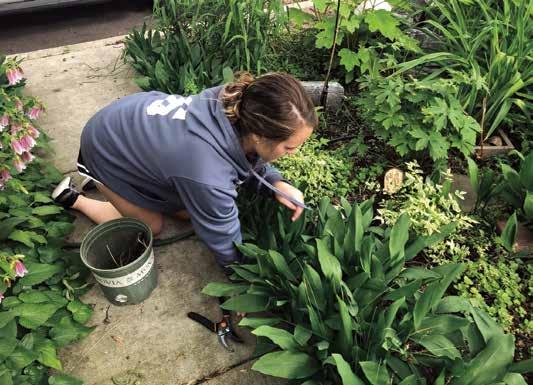
2 minute read
NATURE CONNECTIONS
Nature Connections are Vital for Students This Fall
by Gina Iliopoulos
Advertisement
Photo courtesy of Keeler Gardens this fall, students will not have familiar interactions, varied environment and time set aside for physical activity. Students are also experiencing a different kind of stress and anxiety. Many may be having trouble sleeping or staying engaged with this emotional burden. Now more than ever, youth need the benefits a connection with nature offers.
Some of the proven benefits of a nature connection are an improvement in academic performance, focus, attentiveness and creativity, with a reduction in disruptive behavior, stress and aggression. Those are just a few of the many benefits presented by the Children & Nature Network (ChildrenAndNature.org) on their Tools & Resources page.
Connecting with nature also builds strong communities, encouraging a sense of respect and positive communication. Participants learn not only the direct content of a program, but also added messages of stewardship, resilience and confidence.
Nature connectedness can be promoted with virtual messages: images and videos working distantly through a live feed or online meeting. Even virtual education, experience and immersion has benefits and offers the community another way to be involved and stay connected. Students are already familiar with smartphones and tablets, so technology and virtual programs can work together to offer this nature connection on a regular basis.
Parents may be looking for a plan to aid youth in their nature exploration. Consider incorporating virtual programming at a specific time each day, as well as nature-focused activities for ongoing learning and engagement. Here are five simple tips on how to create nature-focused learning opportunities. n Pick a garden or green space, with each student choosing a spot in that space. Regularly visit that place and spot and note what is happening, what is growing, what is flying around and what has changed since the last visit. This is an opportunity to experience the natural space. n Draw anything nature-related. Start with something easy—a leaf or petal—and if inspired, move to more advanced efforts. n Follow the life cycle of one plant. Note how it grows over time, when it blooms, what pollinators like it and how it produces and distributes seeds.
n Find wildlife and watch them forage, drink, fly, crawl and interact. n Plant herbs and experience the scents
With school continuing online
and flavors. Staying connected to the natural world during COVID-19 is critical, and the resources we discover during this emergency will provide a lifetime of potential learning experiences after it is over.
Gina Iliopoulos is the founder and chief horticultural specialist of Keeler Gardens, located at 3631 N. Keeler Ave., in Chicago, which offers direct and extended programming for a nature connection. View interactive live videos at Facebook.com/KeelerGardens. For more information, email Gina@KeelerGardens.org or visit KeelerGardens.org.
Keeler Gardens
Nonprofit Keeler Gardens offers a much-needed connection with nature on the North Side of Chicago in the form of a native pollinator habitat that is open to the public, right on the sidewalk in a residential neighborhood. The space is an active, abundant source of activity for students in need of unique learning opportunities to improve the health and sustainability of urban community life through environmental experiences, supporting diversity and youth development and building a love of nature.










